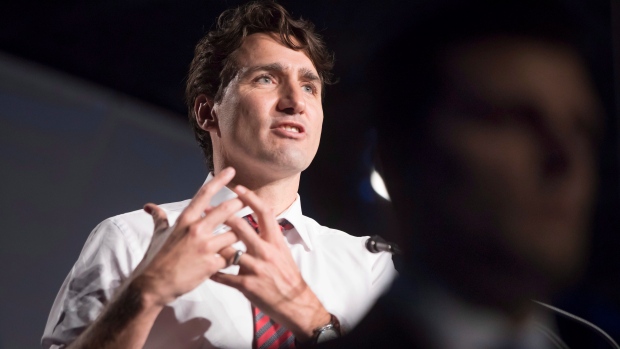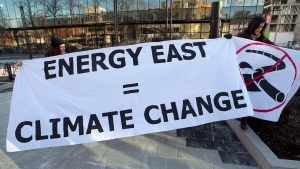Dec 2, 2016
There’s an even bigger pipeline problem facing Justin Trudeau

Prime Minister Justin Trudeau may believe he has settled the great Canadian pipeline debate, but an even bigger battle is brewing ahead of his meeting next week with provincial leaders.
Approving two new oil sands export pipelines this week, while at the same time pushing hard for a national price on greenhouse gas emissions, supports Trudeau’s campaign promise to balance economic growth with environmental protection. Yet several provincial leaders and business executives support another far more controversial pipeline proposal – Energy East – even though Ottawa’s seal of approval for Kinder Morgan’s Trans Mountain expansion makes approving TransCanada’s controversial $15-billion Energy East project far less likely.
“Energy East is just as, if not more, important than the Trans Mountain and Line 3 approvals,” Darren Gee, CEO of Calgary-based Peyto Exploration, told BNN via email, referencing the two pipelines that won green lights from Ottawa earlier this week. “Energy East would not only allow for Canadian production to reach tidewater and additional export markets but also for eastern Canadians to stop buying foreign oil and instead support the Canadian economy.”
“It’s almost a double whammy when it comes to a positive boost for the Canadian economy,” Gee said.
If approved, Energy East would be the largest pipeline project in Canadian history, spanning more than 4,600 kilometers and shipping more than one million barrels of crude oil from western Canada to the Port of Saint John in New Brunswick. That volume would surpass the combined increase in export capacity from both the Trans Mountain expansion (roughly an extra 500,000 barrels per day) and Enbridge’s Line 3 replacement (roughly an extra 300,000 bpd).
“Energy East, that is a priority project for us,” Saskatchewan Premier Brad Wall told BNN on Thursday. “There will be more Saskatchewan Bakken oil in that pipeline than anything else we have talked about.”
NOTLEY NOT WASTING TIME
Alberta Premier Rachel Notley was singled out for praise by Trudeau for her government’s plan to impose carbon taxes and an overall cap on oil sands emissions. The Prime Minister said those moves were critical for Trans Mountain and Line 3 obtaining the “social license” necessary for approval, but Notley is wasting no time moving on to the next target.
“We would like to have even more diversity in our market opportunities,” Notley told CTV’s Power Play on Wednesday. “I know New Brunswick would like to be able to invest in upgrading oil from Alberta [and] we would like to have people in Ontario buying oil from Alberta as opposed to offshore sources.”

Saskatchewan’s Wall is perhaps the staunchest opponent of Trudeau’s plan to impose a national price on greenhouse gas emissions. Conceivably, the prime minister could offer Wall and other pro-pipeline premiers more support for Energy East if they agree to drop their opposition to his carbon price plan. Wall, however, appears to have zero interest in striking any grand bargain.
“I wouldn’t want to make [carbon taxes] a bargaining chip [because] the timing of a national carbon tax is problematic for us,” Wall told BNN. “Imagine if in 2009 the federal government were going to have a tax that disproportionately hits the auto manufacturing sector. Canadians would have thought that to be not very wise, yet that is exactly what we’re talking about right now.”
There is “still room” for Energy East to be approved despite the Trans Mountain and Line 3 approvals, Natural Resources Minister Jim Carr told BNN earlier this week.
Tempers are running especially high in the wake of the pipeline approvals this week. Green Party Leader Elizabeth May declared a willingness to “go to jail” in order to stop Trans Mountain; and on Friday, a group of protesters disrupted an unrelated event in Toronto featuring the Prime Minister in order to voice their opposition.
Energy East has already courted immense controversy. In September, all three members of the National Energy Board panel charged with reviewing Energy East were forced to step down over alleged conflicts of interest.
Replacement panel members have yet to be named, which makes it nearly impossible to determine how long the regulatory review process might take to complete. Ottawa had already extended the review timeline in January by nine months, meaning no NEB recommendation can be expected until at least 2018.
ENVIRONMENTAL CREDIBILITY
Then there is the question of Trudeau’s environmental credibility, which many believed was severely damaged by his decision to allow any new pipeline construction to move forward. He justified his decision by arguing the two pipelines he approved would not lead to an overall increase in emissions; but according to the Canadian Environmental Assessment Agency, that is only true if Trudeau rejects Energy East and any other pipeline proposals that are still pending.
“If the Trans Mountain Expansion project is the only additional pipeline capacity added from Western Canada… it is likely that the upstream emissions calculated in this assessment would occur regardless of whether the project was built or not,” reads an excerpt from the May 2016 CEAA report.
The report goes on to argue “incremental production is more likely to be enabled by increased pipeline capacity” beyond just Trans Mountain. While the report does not specify what a multi-pipeline scenario would mean for emissions, it seems safe to assume an overall increase of some sort would be unavoidable.
That leaves little room for Trudeau to achieve consensus among provincial leaders for his climate strategy. It also leaves a similarly tight space for premiers to push the prime minister – along with more pipeline-wary premiers such as Philippe Couillard of Quebec – toward another approval.
There is still a full week before they all sit around a table in Ottawa together, but they might have already reached an impasse.


